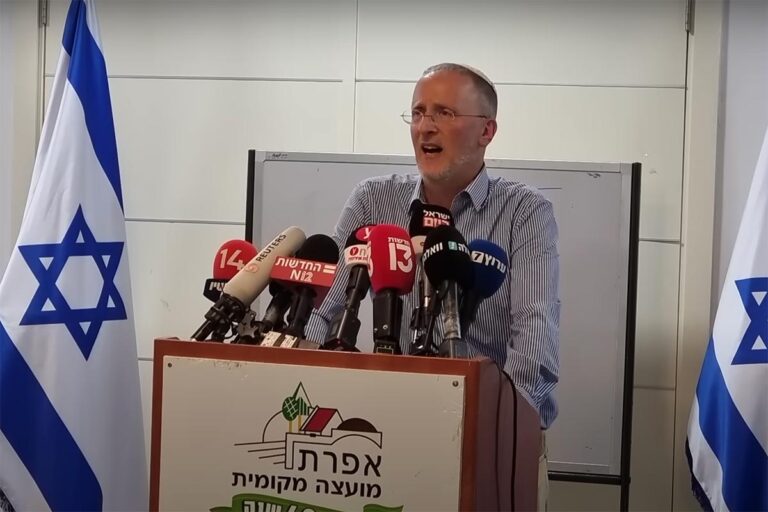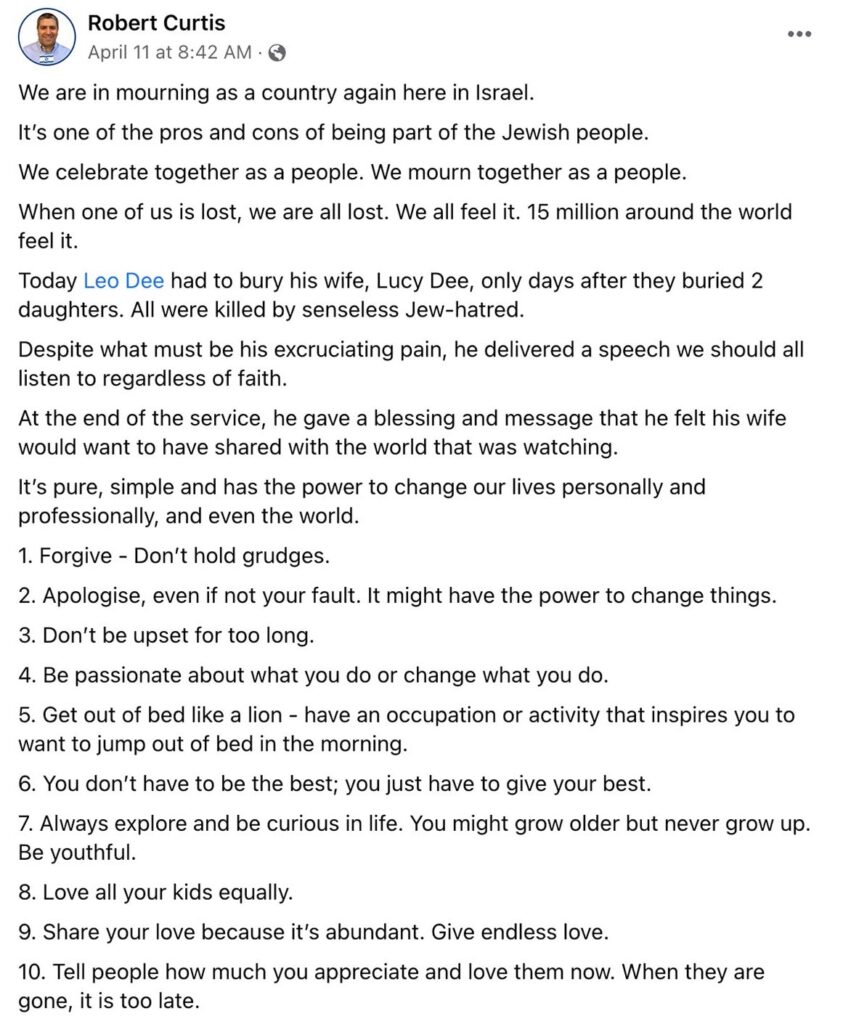
How should we deal with tragedy? We’ve been thinking about that question after watching how one Israeli family responded to a terrible tragedy.
Leo and Lucy Dee along with their five children were traveling from Efrat to Tiberias on a family trip. In one car was Lucy with her daughters, 20-year-old Maia and 15-year-old Rina. In the other car, just ahead, was Rabbi Leo Dee and the rest of the siblings — Keren, Tali and Yehuda.
Lucy and her two daughters were driving through the Jordan Valley when Palestinian gunmen opened fire at their car, killing Maia and Rina and critically injuring Lucy.
תיעוד הפיגוע בבקעת הירדן, הנשק המרכזי: חופש תנועה מלא למחבלים. pic.twitter.com/8oriXeHRQW
— תורת לחימה (@Torat_IDF) April 7, 2023
The three victims were dual Israeli-British citizens and the family had been living in Israel for eight years.
Three days later, on April 10th, Lucy Dee died from her wounds. After finding out his wife had died, the day after he buried his two daughters, Rabbi Dee gave a speech declaring April 10th Dees Day, a day to “differentiate between good and evil, right and wrong,” an ability which has “gradually been lost from humanity.”
“Our family of seven is now a family of four” – Rabbi Leo Dee
— Chaim • חיים (@ChaimSmierc) April 10, 2023
The heart breaks 💔 pic.twitter.com/w5ieVq81wq
In the aftermath of the tragedy, Rabbi Dee and his surviving children showed unbelievable strength and courage. The ways they responded are almost incomprehensible to us. And yet, there is so much that we learned from the way Rabbi Dee in particular responded to this.
Here are four main takeaways on what we learned from the Dee family about dealing with tragedy. Now, let’s be clear. These ideas won’t entirely ease the pain of tragedy. But they can help us navigate these moments with greater perspective, calm and clarity.
Watch our video on this topic at Today Unpacked:
1. Focus on what you do have and not what you don’t have.
When Rabbi Dee eulogized his wife Lucy, he did something almost incomprehensible. He began by asking the community to sing “Ani Ma’amin,” “I believe with complete faith.”
It was the ultimate reversal. At this moment, after losing his wife and two daughters, he is the person who should be needing the most comfort from others, and yet he is giving faith, comfort, and security to everyone else.
Less than 48 hours earlier, at Maia and Rina’s funeral, he shared how and why he continues to have emunah, faith, in the face of unspeakable tragedy.
“There is one main formula for emunah: always focus on what you do have and not on what you do not,” he said.
Of course, appreciating what we still have doesn’t take away the pain of what we’ve lost. It’s a challenging and difficult idea both in theory and in practice. But focusing on what we still have is one tool we can use in a time of tragedy to find emunah and comfort.
2. After a tragedy, give something to someone else.
When something terrible happens, when we’re feeling really down or depressed, the last thing we’re probably thinking about is going out of our way to help others. But this is precisely what the Dee family did.
Hours before Lucy’s funeral, the family decided to donate her organs, saving the lives of five people.
“Dee’s heart went to a 51-year-old woman, her liver to a 25-year-old man, and her kidneys to two men — one in his late 30s and one in his late 50s. Her lungs were transplanted into a 58-year-old woman,” the Times of Israel reported.
Israel National Center for Transplantation has confirmed that the organs of 48-year-old Lucy Dee have been transplanted, saving multiple lives:
— Michael Dickson (@michaeldickson) April 11, 2023
Heart: 51 year old
Lungs: 58 year old
Liver: 25 year old
Kidney: 58 year old
Kidney: 39 year old
Corneas will be donated today. pic.twitter.com/bHm4MAMBbM
Dr. Eviatar Nesher, who was involved in transplanting the organs, said he was extremely moved by the strength of the Dee family, saying: “Their generosity is incomprehensible in the face of such a horrific tragedy.”
Why should we be generous in a time of tragedy? The late Rabbi Jonathan Sacks offered a great answer:
“The paradox of giving is that when we…give to another, it is we ourselves who are lifted. I believe that what elevates us in life is not what we receive but what we give.”
3. Live your life according to eulogy values, not just resume values.
In his eulogy for Lucy, Rabbi Dee recalled one of his wife’s favorite topics to discuss at the Shabbat table with their family.
“The late chief Rabbi Lord Jonathan Sacks once instructed us to ask three questions around the family table: What did you do for someone today? What did someone do for you today? And what did Hashem do for you today? Try it, it’s amazing, it forces you to think about the important things in life and not the day-to-day stuff, what Rabbi Sacks calls eulogy values not the resume values,” he said.
He concluded with a blessing and message from Lucy, of what he felt she would have said, and here’s some of it:
- Forgive. When you hold grudges, it only hurts you.
- Apologize. Even if it’s not your fault.
- Don’t stay upset for too long, and
- Be passionate about what you do. If you aren’t, change what you do.

4. Remember you are not alone, and show up for others.
Rabbi Dee insisted that he and his three remaining children were not alone — instead, the entire country and Jewish people experienced the pain and were crying together. The outpouring of support and condolences the family received had proven that.
“Today the Jewish people have proven that we are one, we are united, am echad. When a simple quiet family in Efrat is devastated, the whole country hurts. And when a family in Tel Aviv is devastated, the whole country hurts. There’s no greater proof of our unity,” he said.
This is an exceptionally powerful response to am unfathomable tragedy. pic.twitter.com/lOw6Fj8map
— Mordechai Burg (@RavBurg) April 9, 2023
He also called on the entire Jewish world and everyone who felt the pain to show their support by posting a picture of an Israeli flag.
“If you feel that it was wrong to shoot dead at close range three beautiful innocent young ladies in the prime of their lives, then please post a picture of you or your spouse or your children with an Israeli flag or just post a picture of an Israeli flag and share it…Let the Israeli flag today send out a message to humanity which is we will never accept terror as legitimate,” he said.
Sharing an Israeli flag on #deesday per Rabbi Leo Dee’s wishes to Differentiate between terrorist and victims, between good and evil. pic.twitter.com/PoDdUk929s
— Allison Josephs (@jewinthecity) April 11, 2023
“Let the Israeli flag today send out a message to humanity which is: We will never accept terror as legitimate. We will never blame the murder on the victims. There is no such thing as moral equivalence between terrorist and victim. The terrorist is always bad.”#DeesDay pic.twitter.com/uQOvpe8rEM
— Dan Elbaum (@dan_elbaum) April 11, 2023
Rabbi Dee said that the key to faith is focusing on what you do have. A message like that might be easy for many of us to say, but hearing it from Rabbi Dee after losing two daughters and his wife makes us think that maybe it really is possible to have faith like that.
Originally Published Apr 14, 2023 10:26AM EDT
